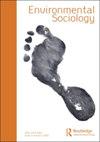Livelihood discourses at the water-energy-food-nexus in Victoria’s Coal Seam Gas (CSG) debate
IF 2.8
Q3 ENVIRONMENTAL STUDIES
引用次数: 0
Abstract
ABSTRACT Onshore Coal Seam Gas (CSG) extraction is a controversial practice that has attracted scrutiny from stakeholders surrounding its risk to livelihoods and the environment at the water-energy-food nexus. Victoria’s 2016 public Inquiry into Unconventional Gas provided an opportunity to evaluate how stakeholders conceptualise the role of livelihoods at the water-energy-food nexus and how discourses were deployed to interpret the risks and benefits of CSG development. This paper argues that the relationship between CSG, livelihood assets and resource security is discursively constructed as a form of power and plays a significant role in both nexus modelling and CSG decision-making. This is supported by the application of Critical Discourse Analysis (CDA), which determined that stakeholders regularly considered livelihood assets to be crucial to both sustaining livelihoods and resource security in Victoria. Based on these findings, a revised water-energy-food nexus model is presented where livelihood assets are positioned at the centre of the nexus framework. This paper concludes by considering how competing environmental discourses are likely to shape the future of Australia’s water, energy and food security in ongoing CSG debates more generally.维多利亚州煤层气(CSG)辩论中水-能源-食物关系的生计话语
摘要陆上煤层气开采是一种有争议的做法,在水-能源-粮食关系中,它对生计和环境的风险引起了利益相关者的密切关注。维多利亚州2016年对非常规天然气的公开调查提供了一个机会,以评估利益相关者如何将生计在水-能源-粮食关系中的作用概念化,以及如何运用话语来解释CSG开发的风险和收益。本文认为,CSG、生计资产和资源安全之间的关系是作为一种权力形式进行的,并在关系建模和CSG决策中发挥着重要作用。这得到了批判性话语分析(CDA)应用的支持,该分析确定利益相关者经常认为生计资产对维持维多利亚州的生计和资源安全至关重要。基于这些发现,提出了一个修订的水-能源-粮食关系模型,其中生计资产位于关系框架的中心。本文最后考虑了在正在进行的CSG辩论中,竞争性的环境话语可能如何影响澳大利亚水、能源和粮食安全的未来。
本文章由计算机程序翻译,如有差异,请以英文原文为准。
求助全文
约1分钟内获得全文
求助全文
来源期刊

Environmental Sociology
ENVIRONMENTAL STUDIES-
CiteScore
4.60
自引率
12.00%
发文量
34
期刊介绍:
Environmental Sociology is dedicated to applying and advancing the sociological imagination in relation to a wide variety of environmental challenges, controversies and issues, at every level from the global to local, from ‘world culture’ to diverse local perspectives. As an international, peer-reviewed scholarly journal, Environmental Sociology aims to stretch the conceptual and theoretical boundaries of both environmental and mainstream sociology, to highlight the relevance of sociological research for environmental policy and management, to disseminate the results of sociological research, and to engage in productive dialogue and debate with other disciplines in the social, natural and ecological sciences. Contributions may utilize a variety of theoretical orientations including, but not restricted to: critical theory, cultural sociology, ecofeminism, ecological modernization, environmental justice, organizational sociology, political ecology, political economy, post-colonial studies, risk theory, social psychology, science and technology studies, globalization, world-systems analysis, and so on. Cross- and transdisciplinary contributions are welcome where they demonstrate a novel attempt to understand social-ecological relationships in a manner that engages with the core concerns of sociology in social relationships, institutions, practices and processes. All methodological approaches in the environmental social sciences – qualitative, quantitative, integrative, spatial, policy analysis, etc. – are welcomed. Environmental Sociology welcomes high-quality submissions from scholars around the world.
 求助内容:
求助内容: 应助结果提醒方式:
应助结果提醒方式:


